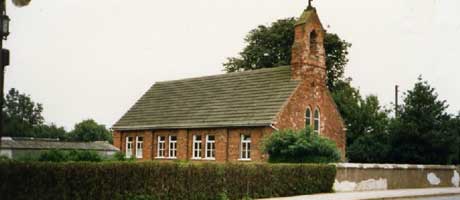Luddington (Ludintone)
No chapels exist within the village but in former times, the Wesleyans and the Primitive Methodists each had one, the former originally built in 1837 and later enlarged, and the latter built in 1841.
In the main, Luddington has seen little in the way of widespread residential development. In later years property along a part of the High Street has been demolished and infill has been slow to take place. On such a site stood the old Friendship Inn then making up a unique combination of three public houses along this short stretch of highway, the surviving two being the Blue Bell Inn and the Lincolnshire Arms. At the northern end of High Street stands the village primary school, a modern building of single storey construction, and nearby the village hall, the official opening of which was performed by Councillor Donald M. Stewart, in 1984.
Two shops serve the small community, one of these in conjunction with the village Post Office. Directly over the road from the Post Office, in days gone by, stood the village stocks, for punishable offenders. A legacy of its existence remains in the aptly named 'Stocks House' built on this site. Reliable sources among the community tell of the day when Mr. A. Spencer, now one of Luddington's oldest surviving residents and formerly of 'Stocks House', unwittingly cut up the old stocks for use as firewood (leading one to assume that the dreaded contraption at this time was in a less usable state of repair than the days when it reliably secured its victims!)
The great survey following the Conquest revealed the parish of Luddington to have been a river island, having the Meredyke on the south, the Trent on the east and the Don on the north and west. At this time it constituted the most northerly parish within the Isle of Axholme. Its origins are ancient and it is said the name comes from 'the town of the descendants of Ludda or Lodda', an Engle or Saxon. One of the smaller villages in the Isle, Luddington has a present population of around 400 and this shows a proportional decrease from a time in the mid-19th century when the figure rose from 511 to 684. At this time Earl Manvers was Lord of the Manor.
The village contains two churches, one of which is the Anglican parish church, dedicated to St. Oswald, the other being of the Catholic denomination, dedicated to St. Joseph and St. Dimphna. Previous to the present parish church there stood about this place another, described as of the Norman-Saxon period. It was cruciform in design and was originally surmounted by a wooden steeple. The new church is in the Early English style and was opened for divine worship in July 1855. It is situated someway out of the village and its distinctive spire, containing three bells, serves as a pleasant landmark amid the flat surrounding countryside. The old Vicarage, a most spacious and attractive residence on the High Street, is now the private dwelling house.
Perhaps more than any other in the Isle, the township of Luddington is synonymous with the influx of Irish labouring 'gangs' in the latter half of the 19th century. Famine and extreme poverty in their homeland, resulted in vast numbers of single men as well as whole families crossing the Irish Sea to England and making their way to Axholme, where they were engaged as useful and hardworking extras during the corn and potato harvests.
Such names as Kenny, Nolan, Gordon, Donoghue, Kelly, Brady, McEwan and McHugh were commonplace in the Luddington district for many years and whilst most returned after several months of continuous labour to their respective counties, mainly in the west coast of Ireland, more than a few remained and became absorbed into the local community. It is generally said that Luddington today comprises to a large extent descendants of these people, some easily identifiable with names such as Curry and (Mc) Tighe. Indeed, the Census records of the time abound with the names of the families of these adventurers, who came over in hard times, worked the land and significantly left their mark and influence amongst us.
In these modern times the phrase 'ta-ty scratting' (potato picking) is still regularly used within the farming fraternity. Can we suppose it is indicative of earlier times when Axholme played host to our overseas cousins from Ireland?
Established names in the Luddington district, other than those mentioned, include Gelder, Slingsby, Burkill, Stothard, Smith and Spencer. The Parish Registers start from the year 1700, but records in the form of Bishop's Transcripts date from 1599. These records, excepting those in present usage, are deposited at the Lincoln Archives Office and may be consulted on microfilm.

